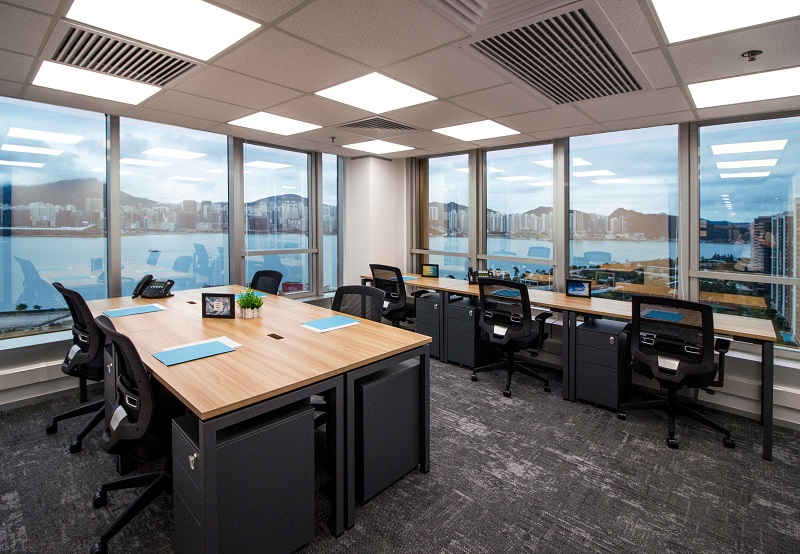If your startup has been doing well for some time, you’ll reach a moment where you’ll want to move the business forward. The first thing that comes to mind is a new, shiny office space with glossy furniture.
There are plenty of physical office options like serviced office, coworking space, or the conventional office rental. However, when you’re an online-based startup, you should also look into virtual office before making an investment on a physical office.
This article will compare virtual office with physical office space to help you decide the right type and timing to set up your own office.
Virtual Office
If you conduct most of your commerce online and your employees already work effectively from home, having a traditional physical office space is not always the best solution.
A virtual office allows your business to have a physical presence without you or your employees having to be physically present at that place. In Hong Kong, virtual offices are hosted in prominent business centres.
On top of that, getting a virtual office can be done for just a small chunk of your budget. You can invest the spare cash in your employees’ benefits, invest back into the company, and expand your team regardless of their location.
Virtual Office Benefits
1. Less overhead cost.
First of all, a virtual office is much cheaper than a physical one. When you have a physical office you may need to spend more on:
• Monthly expenses (rent/bills)
• Furnished office space
• Equipment and supplies
• Cleaning fees
• Daily commute
2. Own a professional business address.

You can have your own address in major cities’ business centres instead of giving your personal address to your clients. The business address makes you seem more professional while you are working from home. You can include the address on your paperwork, brochures, business cards, and websites to make it look even more appealing to potential clients.
Furthermore, a business address separates your personal and private life, so all business-related mail goes to your virtual office and not at the same mailbox as your magazine subscription.
3. Own a dedicated phone line.
In addition to business address, some virtual office offers a dedicated telephone line. The calls are handled by professionally trained, multilingual team of operations staff. This helps to create a professional image and assists you to focus on your core business operations.
4. Less expansion cost.
Virtual office can also help if you want to expand to other markets. Since you can register for a virtual office in another country, your business can have a presence in the country without you physically being there.
See the location of virtual offices in Asia and Australia for business addresses in other countries.
5. Access to conference rooms, breakout areas, and business lounges.

Most virtual offices are part of large business centres, and offer virtual office packages that allow you to access meeting rooms, breakout areas, and business lounges for a certain period in a month. This offers you flexibility to occasionally have face-to-face meeting with your team or clients.
6. Save commute time and get flexible work hours.
Keep your hours flexible by working from home. You don’t have to spend an hour or two travelling from home to work and back. Instead, you can invest that time in working or resting.
Physical Office
As a startup, you can select physical offices like:
1. Serviced office
2. Coworking space
3. Conventional office rental
Advantages of a Physical Office Space
There are some things that virtual offices lack compared to physical office. On top of getting a business address, dedicated phone line, and access to conference rooms or breakout lounges, below are the additional benefits of having a physical office:
1. Social and physical interaction between employees.
One of the major benefits of working in a physical office is you can spend time with your colleagues, sharing work-related and personal stories on a daily basis.
2. Arguably less distractions compared to working from home.
Working from home can bring a multitude of distractions due to less separation of work and home chores. It may also cause the occasional lack of motivation compared to when seeing all colleagues working together.
3. Convenience of shared equipment and infrastructure.

Physical office space like serviced offices and coworking space come with facilities like dedicated work stations, secured IT infrastructure, scanners, printers and copiers for everyone who use the office. With virtual office, your team need to seek access for the equipment independently.
Should Your Startup Get an Office?
As a conclusion, if you are looking to save cost, your dealings are mostly online based, and your team can still work effectively without shared equipment and infrastructure, a physical office is not a must. With virtual office, you can reinvest the money that you save into your business and your employees, thus expanding your business further.
However, when you value additional benefits like daily interactions between employees and the convenience of having a shared infrastructure in one place, a physical office would be a great option.
Explore various office types in Asia and Australia’s business districts.